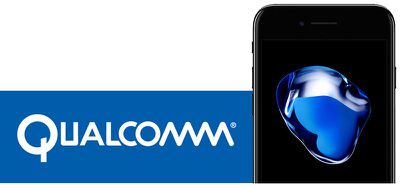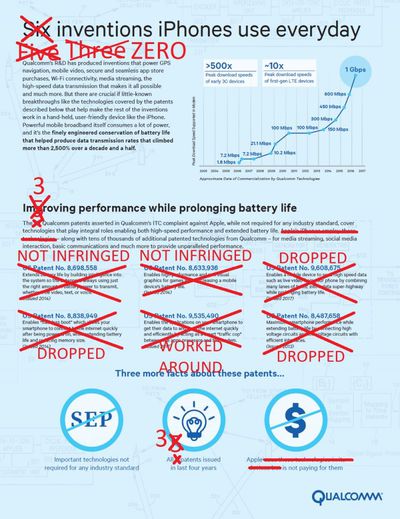Back in 2017, Qualcomm filed a complaint with the United States International Trade Commission (ITC) accusing Apple's iPhones of infringing on six Qualcomm patents.
Qualcomm was hoping to ban imports of select iPhone and iPad models using Intel modems, but as it turns out, the company's efforts have been a poor use of time and money.

As outlined by FOSS Patents, in a recent filing with the ITC Apple said that it has implemented an iOS 12.1 workaround to one key patent in the complaint, U.S. Patent No. 9,535,490, which covers "power saving techniques in computing devices."
Apple said that it introduced changes in iOS 12.1 to make sure that it does not violate the '490 patent, though the company claims the original design wasn't in violation to begin with.
Qualcomm's own Chief Technology Officer has said that there are alternate design options to skirt the '490 patent, which Apple submits as evidence that the '490 patent should not be valid in the ITC complaint.
Qualcomm's presentation at the hearing crystallized its theories regarding the scope and coverage of claim 31 of the '490 patent. Against that backdrop, Apple recently changed its software (i.e., iOS) to remove the functionality that Qualcomm has accused of infringing claim 31, by implementing a design change that Qualcomm's own witnesses conceded would fall outside the scope of the patent. [...]
This fall, after the close of the hearing record, Apple implemented a new software-based design for its Accused '490 Products that removed the accused UL/DL synchronization feature that Qualcomm emphasized could be 'simply remove[d]' to avoid infringement of the '490 patent. To be clear, the pre-change versions also do not infringe the '490 patent, and thus there is no legal need to 'design around' it. But to moot any possible allegation of infringement from Qualcomm, Apple changed its products to do precisely what Qualcomm's own witnesses testified would not infringe the '490 patent."
According to FOSS Patents' Florian Mueller, given Qualcomm's prior comments about the ease of implementing a suitable workaround, Qualcomm won't be able to credibly dispute Apple's plan.
Qualcomm's original ITC complaint against Apple mentioned "six inventions" iPhones use that infringed on Qualcomm patents, but as FOSS Patents outlines in the handy infographic below, many are no longer valid.

Qualcomm has dropped three of the six patents, the Administrative Law Judge (ALJ) in the case said that Apple did not infringe on another two, and as for the last, it's the one that Apple added a workaround for in iOS 12.1.
Given the weakness of Qualcomm's complaint, the company is not likely to win its case, and even if it does, it won't cover Apple's iPhones that have the iOS 12.1 software update.
Apple and Qualcomm will go to trial over the original dispute in April, with Qualcomm having been unable to establish leverage over Apple thus far with its U.S. ITC complaints. Apple and Qualcomm will be fighting over royalty payments and anticompetitive patent licensing practices.



















